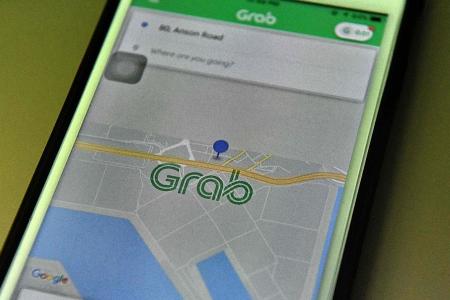Grab cuts rider discounts, driver incentives
Ride-hailing firm says rollback not linked to Uber acquisition, offers other perks to users and drivers
Ride-hailing company Grab said yesterday that it has been rolling back its discounts for customers and incentives for drivers, but dismissed the link between the move and its acquisition of rival Uber.
The deal had prompted concerns that ride-hailing fares would rise, but Grab Singapore head Lim Kell Jay said at a media interview that incentives and promotions had been "trending down" even before the acquisition two months ago.
He did not say when this started but that it had "been a while".
Driver incentives and customer discounts were strategies employed heavily by both Grab and Uber - which had been locked in a battle for market share before the latter's exit - resulting in both companies burning through investors' funding.
Customers, for example, could enjoy $5 off a certain number of rides, while drivers would get a bonus monetary amount for completing a target number of trips.
For passengers, Mr Lim said, the company has shifted towards a reward system - in which customers earn points for taking Grab rides.
These points can be exchanged for other goods and services, such as food vouchers or airline flyer miles.
"The discounts you get from your Grab rides are still there. You just need to redeem them from the rewards catalogue... I personally believe it is more exciting that way, rather than just promos," Mr Lim said.
"With promotional codes, some (customers) get them, others don't."
As for its private-hire car drivers, Mr Lim said the company monitors their income very closely before reducing the incentives given.
"We make sure the fares they earn continue to grow, basically giving them as many jobs as possible within the same amount of time," he said.
To help drivers reduce costs, Grab has partnered petrol companies for discount schemes, and worked with rental car firms to offer drivers competitive leasing rates, Mr Lim added.
Private-hire car driver Eric Lim, 45, said that Grab recently removed the GrabEasy incentive, which had a $150 bonus every week for doing 100 trips.
"I was not informed beforehand," he added.
During a media briefing yesterday, Grab announced three new products on its app: A GrabAssist service for elderly riders and those with reduced mobility, a GrabFamily service for families with toddlers aged between one and three, and a GrabCar Plus service that offers customers newer cars and top-rated drivers.
GrabAssist and GrabFamily are based on services previously offered by Uber. The former is already available, while the latter will be rolled out by end-June. GrabCar Plus will debut by the end of this month.
Grab is also beta-testing a GrabFood food delivery app, which will replace the UberEats service, which it bought over through the Uber acquisition.
Assistant Professor Yang Nan of the National University of Singapore Business School's strategy and policy department said that when Grab cuts back on customer promotions, demand will fall, resulting in fewer jobs for drivers.
With fewer incentives, there will also be a lower supply of drivers, and some who are not willing to settle for a lower income will quit. The remaining drivers could have more jobs, he said.
"The number of rides will decline, but Grab will earn more from each ride - more than covering the loss of rides - and a higher profit," Prof Yang added.
Get The New Paper on your phone with the free TNP app. Download from the Apple App Store or Google Play Store now

